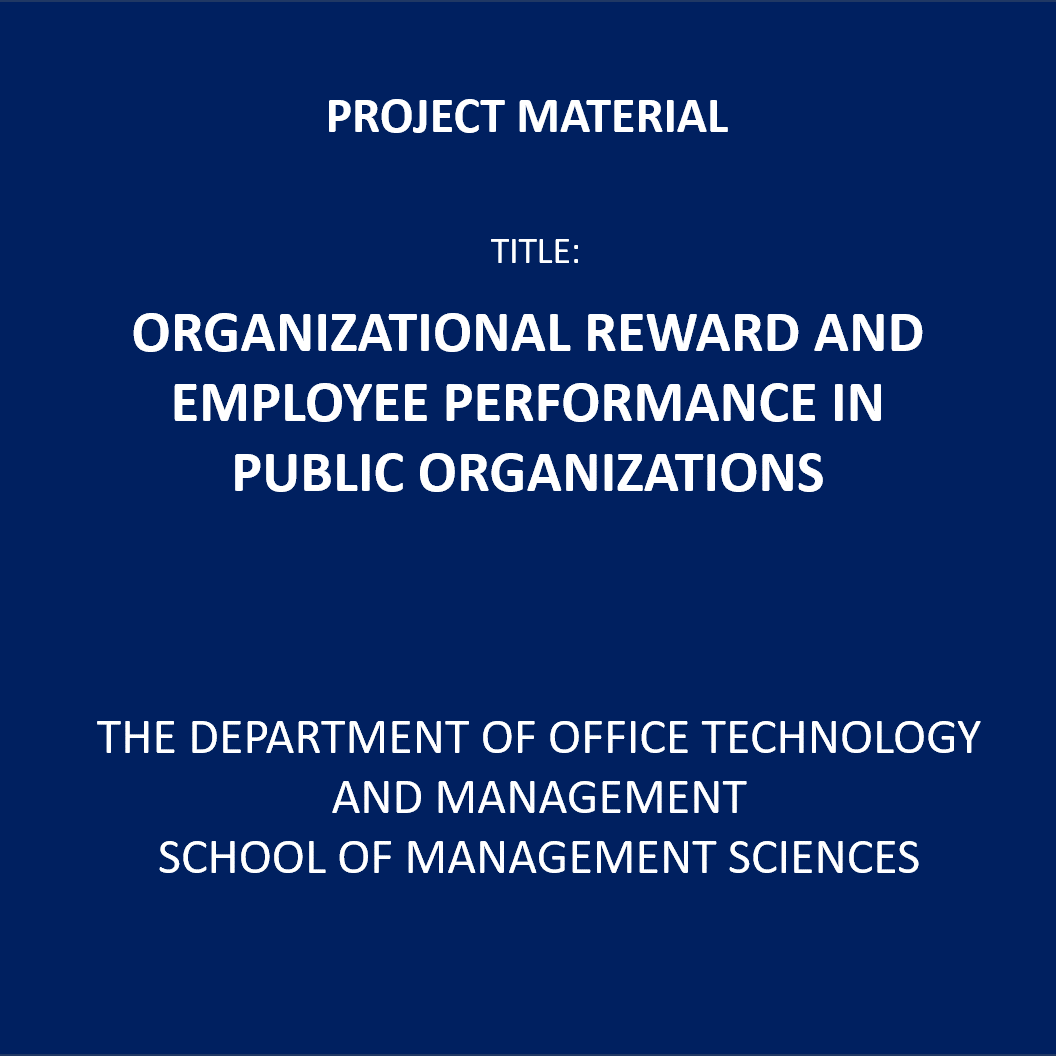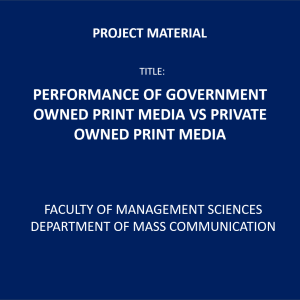ORGANIZATIONAL-REWARD-AND-EMPLOYEE-PERFORMANCE-IN-PUBLIC-ORGANIZATIONS.pdf
₦10,150.00
ABSTRACT
The aim of this study was to examine the relationship between Organizational rewards and Employee Performance in some of the xxxxxxxx State Government Parastatals; using the Ministry of Sports, xxxxxx State Inland Revenue and the Ministry of Culture and Tourism. The study argues that bonuses, promotion, employee compensation and employee recognition correlate with employee
performance. Primary data was collected with structured questionnaire from one hundred and twenty (120) staff of the xxxxx State Ministry of Sports, xxxxx State Inland Revenue and the Ministry of Culture and Tourism containing sixteen (16) questions was used for data collection. Mean and standard deviation were used for data analysis. The researcher administers the instrument with one research
assistant. The study revealed a significant and positive relationship between organizational reward and employee performance. the study, therefore records that organizations should strive to improve on monetary and non monetary reward packages for their employees in order to get the best out of them.
Background to the Study
The survival and the success of any organization are determined by the way the employees are remunerated and rewarded (Lawler, 2003). Your employees are at the heart of your business. You hired them to help you gain and maintain success, and they are, at least initially inspired to perform the work necessary to achieve your goals. Rewarding your staff when they effectively fulfill your directives is an often
overlooked yet critical management tool. When properly administered and communicated, a reward program can create and maintain a highly motivated employee force working for the prosperity of your business (Michelle, 2021). Employees perform better when they are motivated by reward packages from their employees; it boosts their willingness to go extra mile and speedy completion of task
which enhances profitability and success of the organization. Rewards motivate employees to do work hard. All employees are motivated by rewards. So if we want to get a success in competitive environment then we must need to achieve high performance of employees. Some people are motivated by extrinsic rewards such as 11 increase in pay, promotions and bonus. However, for any organization to achieve its
objectives in any competitive society, employers of labour must have a thorough understanding of what drives the employees to perform efficiently and reward them accordingly (Mueller, 2011).
Besides, employees must be motivated through adequate reward systems and this will invariably encourage them to be proactive and have right attitude to work, thereby promote organizational productivity (Armstrong, 2007). In any endeavor that an individual undertakes, motivation (or the lack thereof) is the key element behind the success or failure of the endeavor. It plays a key role in the workplace
where the effective performance of an employee is concerned. Consequently, productivity can only be enhanced if the employees are well motivated through adequate reward packages that are proportional to their performance (Diener and Biswas, 2002, Stolovich, 204, Mitchele and Rob, 2008, Mark 2011).
In addition, the absence of the suitable rewards may negatively affect the hardworking employees’ performance; it may also weaken their productivity at work which decreases the chances of attaining the promising goals of the institution (Palmer 2012). Such rewards are a significant factor in encouraging employees and 12 increasing their enthusiasm, willingness to go extra mile and speedy completion of
task and thereby improving the corporate performance and increasing productivity. Reward management consists of analyzing and controlling employee remuneration, compensation and all of the other benefits for the employees In this study a reward referred to an inducement that is given to the civil servants in state government agencies in order to motivate, encourage and maintain a desired behavior,
According to Hicks and Adams (2003), rewards are mechanics aimed at achieving a specific change in behavior. Whereas performance refers to how well an employee fulfils assigned task through effort and skill, and reward refers to an inducement for a desired action. Reward pay is a form of compensation given to employees upon attainment of some form of job performance (Armstrong, 2009). Organizations have
resorted into the adoption of relevant and appropriate rewards in order to encourage employees to elicit their best skills while increasing their effort. Various forms of reward plans are offered to employees, such as compensation, promotion, recognition and bonus awards.





